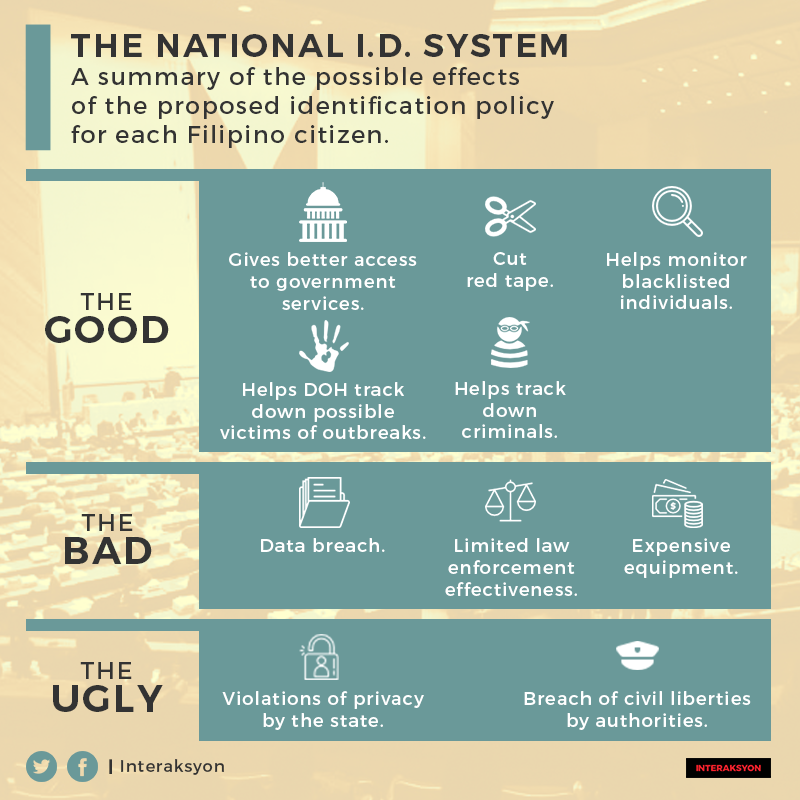Biased Reporting on National ID System Downplays Perils

Screengrab from InterAksyon’s Facebook page.
ACCORDING TO its proponents, the proposed “One for All” ID system will streamline government transactions, making government services more accessible to holders. But there are legitimate concerns about security of data and privacy that need to be addressed.
By merely following the progress of the bill through the legislative process, the media has missed providing a venue for the discussion of the national ID system. The proposed bill will involve creating a national database for the personal information of all citizens, including full name, photo, address, contact details, biometric information, civil status and gender.
As the president’s approval of Senate Bill 1738 (An Act Establishing the Philippine Identification System) draws near, the media has yet to report on the risks that are involved, including possible breach of data privacy, identity and intellectual property theft, digital vandalism and other cyber-attacks; not to speak of, the vulnerability of citizens to police surveillance and political witch-hunt.
Media coverage has cited mostly support for the system. Reports have not found sources to talk about the risks and dangers. There was hardly any space for opposing views. As most media presented it, the Makabayan bloc in the House of Representatives seemed to be the sole voice of clamor against the ID system.
In truth, this is not the case.
CMFR monitored leading broadsheets (Philippine Daily Inquirer, The Philippine Star and Manila Bulletin) and primetime newscasts (ABS-CBN 2’s TV Patrol, GMA-7’s 24 Oras, CNN Philippines’ News Night, and TV5’s Aksyon) from May 23 to May 28.
Background
This has not been the first attempt to push for legislation for a national identification system. As early as 1996, former president Fidel V. Ramos issued Administrative Order 308 (Adoption of a National Computerized Identification Reference System). The Supreme Court invalidated AO 308 on the grounds that it violated the citizens’ constitutional right to privacy.
The national ID debate resurfaced a decade later. In 2005, former president Gloria Macapagal-Arroyo issued Executive Order 420 mandating all government agencies to streamline their identification systems under a Unified Multi-Purpose Identifications (UMID) System.
The Supreme Court ultimately upheld EO 420’s legality, although the debate raised issues of constitutionality; which resulted in the UMID card issued to SSS, GSIS, Philhealth, and Pag-ibig members. Unlike the National ID, the UMID card does not include information like civil status, biometrics and contact details. All of these information could be used by the state to monitor its citizens.
Biased reporting
Given this background, the media’s failure to include the views of experts on constitutional and data privacy issues is irresponsible. And the usual reliance on statements of lawmakers defending their bills reflects a sad lack of diligence to fulfill their obligation to inform the public about issues that affect them.
Most media missed Sen. Leila De Lima’s dispatch statement (“Sen. Leila M. de Lima’s statement on the impending approval by Congress of the National ID System”) released last May 28 by the Senate itself. De Lima warned against a law “monitoring” its citizens under an administration that does not favor human rights and civil liberties. She argued that at a time when the most basic human rights are not only being disrespected, but are systematically being violated by the state, “we cannot gamble away the remaining thin sheet of protection from government abuse that the bill of rights still afford us.”
CMFR cheers Interaksyon for focusing on the perils and benefits of the national ID system, as it cited Sen. Panfilo Lacson who explained in a series of tweets how the ID system benefits the people. It also showed the bill’s negative side, pointing to Comeleak as the Philippine government’s biggest data blunder and showing how vulnerable “secure” information systems can be. It ended with a quote from De Lima’s statement (“Weighing the national ID system for Filipinos: The good, the bad and the ugly”).
A national ID system is particularly controversial in countries where there is little trust of the government’s competence in handling citizen data and the government’s commitment to human rights.
That the media does not seem to care about these concerns is disturbing, to say the least.
Leave a Reply